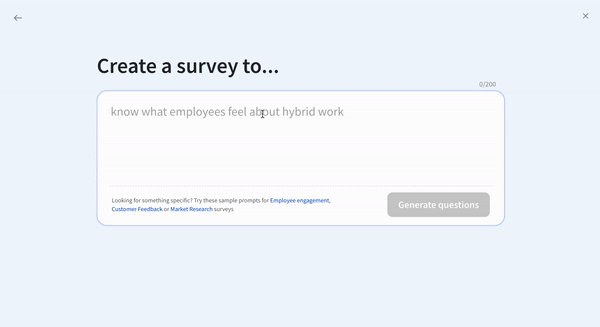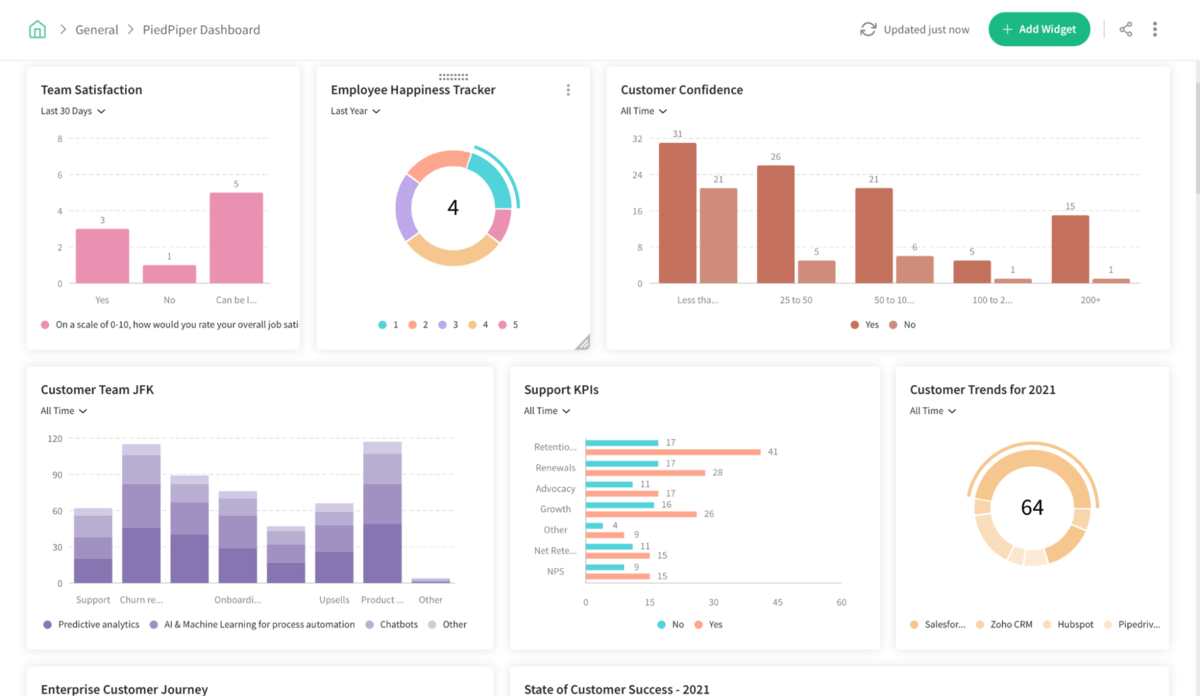Survey & Feedback
10 Best Income Survey Questions to Use When Asking About Finances (+ Example)
Article written by Parvathi Vijayamohan
Content marketer at SurveySparrow.
10 min read
19 September 2025

How do you get details about a person’s finances from a survey form? By using carefully crafted income survey questions.
To help you out, we have created a list of income survey questions below. These questions are designed to measure four different income components – wages, supplemental income, transfers, and assets.
In this blog, you can expect the following –
Let’s get into it.
What are Income Surveys?
Income surveys are sets of questions that focus on helping researchers and organizations learn about individual or household earnings.
These surveys focus on different aspects of income, such as amount, frequency, sources, and so on. The data can help one understand more about the economic standings, income distribution, etc., in a specific population.
Here’s a sample of what an income survey would look like.
Income Survey Questionnaire
Use This TemplateThese kinda surveys are often used by government agencies, research organizations, and businesses. There are more such templates available that too for free. All you have to do is sign up, and all the templates are free to use.
Tips for Writing Income Survey Questions
Income questions are tricky—you need to be clear, respectful, and thoughtful when you ask them. Your goal is to get accurate data without making people uncomfortable. Here's how to do it right:
1. Tell People Why You're Asking
Before you ask the question give a quick explanation of how you'll use the income data. Whether it's for research, to group people, or to make your services better being open builds trust and makes more people answer.
Example: "This helps us understand your needs better and tailor our services."
2. Use Ranges, Not Exact Numbers
Most folks don't like sharing their exact pay. Income brackets feel less nosy and are simpler to answer. They're also easier to crunch numbers on.
Example: $25,000–$49,999 instead of "What is your income?"
3. Always Include a "Prefer Not to Say" Option
Respect people's privacy. Some survey takers might skip the whole thing if they have to answer personal questions. A simple way out keeps them in the game.
4. Keep Wording Clear and Specific
Stay away from fuzzy terms like "earnings" or "financial status." Instead, use plain language like:
Example:"What is your annual household income before taxes?"
This cuts out confusion and helps people give accurate answers.
5. Adjust Ranges for Each Region
Make sure income brackets match local economic conditions. A low income in one area might be middle-class in another. Change the ranges as needed if your survey covers different countries or diverse regions.
6. Use Consistent and Clear Ranges
Choose brackets that are:
Spaced (unless you have a good reason not to)
Listed from lowest to highest
Not overlapping each other
This helps people read and answer the survey more .
7. Try It Out Before Going Live
Do a test run or ask a small group for feedback. It's better to spot and fix any questions that seem unclear or too personal on.
Asking about income in a clear and respectful way doesn't just lead to better data—it helps create trust with your audience. This makes your entire survey more effective.
10 Income Survey Questions for Questionnaires and Forms
The 10 questions we discuss offer insight into various aspects of income. Go through them and see if they are helpful for you.
NOTE: There’s AI for practically everything, and we have something for surveys as well. SurveySparrow AI. Just add the prompt, and the tool will do the rest. Here’s some BTS for you.

The feature is available on the free version of the tool. So, feel free to use it for your needs. You can sign up for a free account below to create more customized forms like this with omnichannel sharing features.
14-day free trial • Cancel Anytime • No Credit Card Required • No Strings Attached
#1. Which of these categories describes your personal income last year?
- Less than $10,000
- $10,000 – $50,000
- $50,000 – $100,000
- $100,000 – $150,000
- I prefer not to say
This income level survey question provides an overview of the respondent’s income. This information can help sort your audience into income segments. Given the diverse types of audiences you could be reaching out to, it’s best to word this question in a way that resonates with them.
#2. What is your total household income? Pick a category.
- Less than $50,000
- $50,000 – $100,000
- $100,000 – $150,000
- $150,000 – $200,000
- I prefer not to say
Household income is the total net income of all members in a housing unit above a particular age, regardless of whether they are related. Household income survey questions are helpful for financial institutions for underwriting loans, economists for indicating an area’s standard of living, and market researchers for segmenting their audience.
#3. Which of these categories describes your personal income last month?
- Less than $5,000
- $5,000 – $10,000
- $10,000 – $50,000
- I prefer not to say
This income question is a discreet way of asking about salary or monthly personal income. This question is often asked by financial institutions, companies who want to determine the average compensation for employees, and businesses to determine product pricing.
#4. Do you receive income from sources other than a salary?
- Yes
- No
- Not applicable
- I prefer not to say
‘Income from other sources’ excludes income from salary, house property, capital gains, or a business/profession. Furthermore, this includes one-time revenues such as winnings from lotteries, horse races, crossword puzzles, card games, gambling, or betting of any form.

#5. Did you receive social security benefits or disability income in the last year?
- Yes
- No
- Not applicable
- I prefer not to say
Asking about social security benefits or disability income is another way to ask about age and health status. Again, these demographic details can help you personalize your communications with that respondent and provide a product/service more tailored to their needs.
#6. Did you earn money selling stocks/bonds/real estate last year?
- Yes
- No
- Not applicable
- I prefer not to say
This income survey question assesses capital gains. Capital gains are the profit one earns from selling an asset – like stocks, bonds, or real estate. Capital gains are made when an asset’s sale price exceeds its purchase price.
#7. Have you received any monetary contributions (like rent or utility payments) from someone who does not live with you?
- Yes
- No
- Not applicable
- I prefer not to say
Personal income can come from more than one source, and the most common sources are salary and supplemental income sources. This question is a way to help respondents separate salary income from extra income like rent payments or utility payments.
#8. Did you receive alimony last year?
- Yes
- No
- Not applicable
- I prefer not to say
This income survey question is a discreet way of finding out the respondent’s marital status – a detail you wouldn’t ask upfront in person, let alone on a survey! We’ve included this question because alimony can sometimes be a source of supplementary income.
#9. Did you receive monetary contributions for child support last year?
- Yes
- No
- Not applicable
- I prefer not to say
This income survey question is an un-intrusive way of learning if the respondent is a parent or guardian to a minor.
#10. Please list all the sources of income that apply to you.
If you want to help respondents itemize income sources they may have missed, use this income survey question. This could include income changes due to mortgaged loans for the respondent’s home. Moreover, you can frame it as an open-ended, multiple-choice, or dropdown question type like in the survey example we shared above.

Sign up for free to access and customize SurveySparrow’s income survey questionnaire sample. Feel free to customize the survey according to your needs.
14-day free trial • Cancel Anytime • No Credit Card Required • No Strings Attached
How Can Income Survey Questions Help You?
It’s probable that you are here because you understand the importance of using an income survey. But, just in case, if you are still on the fence, maybe the following points may help you come to a decision.

#1. Income Disparities
If you are having trouble deciding on how to price your products with respect to the region, it’s crucial you know this. Income surveys with the right questions can help you understand what income is like across countries.
A well-known example to consider here is India and the USA. You wouldn’t price a product the same for both regions, would you? Definitely not! Indians make significantly less monthly when compared to those in the USA. However, the cost of living is much lower in India than in the USA.
Similarly, you can learn about specific regions.
#2. Segment Your Audience
You can segment your target audience based on their income and tailor the offerings accordingly.
Imagine offering luxurious products to middle-class families. It’ll be a total disaster, no doubt about that. Using income survey questions in your regular surveys can help you avoid this.
This way, you can target your audience with relevant and aligned products, leading to a better conversion rate.
#3. Budget Planning
This is more focused on individuals who want to plan and improve their financial situation. Individuals can use these questions to clearly understand where they are lagging behind or wasting money and take steps to resolve them.
#4. Policy Development
Governments and organizations can use income survey data to develop and refine policies related to taxation, social welfare, and economic development. This way, they make policies that are best for their people and facilitate healthy economic growth.
At least some of you are thinking – Maybe my government ought to conduct one before they decide the taxes for their people.
FAQs about Income Survey Questions
What are the five sources of income?
Income sources can fall into five broad categories:
- Employment (wages and salaries)
- Self-employment (independent contractors, sole proprietors, partnerships)
- Property (dividends, interest, and rents)
- Transfers (alimony, child support, worker’s compensation, education, financial assistance, public assistance and welfare, retirement, unemployment compensation, and veteran’s benefits)
- Other (capital gains, betting, etc.)
How do you ask about income level on a survey?
According to Moore, Stinson & Welniak, there are two major challenges in measuring income in surveys. The first is that there are plenty of potential sources of income, as well as losses that impact these earnings. Recalling all of these is a major hassle for survey respondents.
Secondly, few of us like to spill the beans on how much money we earn! So asking lots of income questions can feel invasive.
Consequently, around 10–15% of the income data on surveys goes unanswered because either the respondent refuses to answer the question or because they don’t remember. So, it’s best to frame the answer options as ranges instead of forcing respondents to provide an exact number.


Create engaging surveys that people actually complete. Try SurveySparrow now!
Parvathi Vijayamohan
Parvathi is a sociologist turned marketer. After 6 years as a copywriter, she pivoted to B2B, diving into growth marketing for SaaS. Now she uses content and conversion optimization to fuel growth - focusing on CX, reputation management and feedback methodology for businesses.
Related Articles

Survey & Feedback
11 Best Customer Loyalty Survey Questions You Need to Ask
21 MINUTES
30 August 2021

Survey & Feedback
How To Add Signature On Forms And Its Importance? | Signature Question
7 MINUTES
14 July 2022

Survey & Feedback
Mobile Survey Completion Rates Hit 85%: New Benchmark Study Reveals Why
18 MINUTES
5 December 2025

Survey & Feedback
Likert Scale: Ultimate Guide to Likert Scale Surveys
21 MINUTES
5 December 2018
